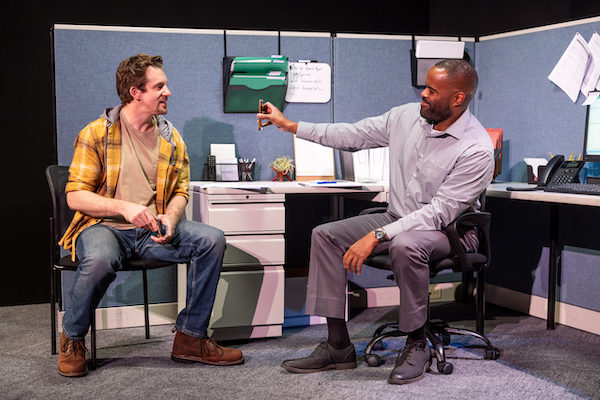Theater Review: “A Case for the Existence of God” — Cry Hallelujah
By Robert Israel
In terms of the joy that theater can provide, this Speakeasy Stage production sets the bar high.

Jessie Hinton and De’Lon Grant in the Speakeasy Stage production of A Case for the Existence of God. Photo: Nile Scott Studios
A Case for the Existence of God by Samuel D. Hunter. Directed by Melinda Lopez. Presented by Speakeasy Stage, Boston Center for the Arts, Roberts Theatre in the Calderwood Pavilion, 527 Tremont St., Boston, MA, through Feb. 17.
A play that is a cause for celebration. Huzzahs for Samuel D. Hunter’s A Case for the Existence of God – a two-hander with a 90-minute running time — which is being given a stellar production at Speakeasy Stage under Melinda Lopez’s feisty and insightful direction.
The play invites the audience members to introspect as it probes the pasts, presents, and futures of its two male characters, Keith (De’Lon Grant), a Black gay man who labors at the mortgage game, and his client (and later friend) Ryan (Jesse Hinson), a straight Caucasian man on a quest to acquire a parcel of property and, in so doing, to claim a piece of the American dream that has slipped through his family’s fingers. Both men are new dads, too. They sit, slumped on office chairs in a cubicle (set design by Cristino Todesco), the weight of their familial responsibilities sitting like tons on their shoulders. As in many of Hunter’s plays, Case is set in the playwright’s native Idaho. We learn that the landscape there — reflected in the flat, parched speech — is similarly semi-arid, rambling, with “nothing out there” except vast stretches of emptiness that his characters can’t help but absorb.
A bit of back story: It has been several years since Speakeasy Stage produced Hunter’s The Whale – which I nominated as one of the best stage productions in 2014. That was the same year the playwright was awarded a MacArthur Foundation “genius” grant for “crafting quietly captivating dramas that explore the human capacity for empathy and confront the socially isolating aspects of contemporary life across the American landscape.” (Hunter later adapted his play into a film, with director Darren Aronofsky; it earned lead actor Brendan Fraser an Academy Award for Best Actor in 2022.) Case draws on the playwright’s decision to enter into parenthood when he and his husband adopted a baby. In a video interview produced by Signature Theatre in NYC, Hunter spoke about how this act of unselfish love has changed his life: “My husband and I … realized that cynicism is cheap and easy and kind of perversely comforting.… Once I had a kid I didn’t have the luxury of being cynical or pessimistic. I had to find some kind of hope.” This is the “faith” the playwright explores in A Case for the Existence of God.
The title of the script forecasts that the dramatist will be grappling with serious issues. Hunter’s challenge is to fit all of the promised substance into a 90-minute running time. The compression works, mostly, with a few exceptions. There are places where the script doesn’t provide us with enough credible evidence about the other men and women who populate the two men’s lives. A slight reference to Keith’s boss, for example, is effective; the quick allusion supplies us with just enough evidence of Keith’s tenuous standing in the office. But the script gives short shrift to Keith’s lawyer father, for example, in the same way it holds back information about just who Ryan’s wife is (he’s going through a divorce). Secondary characters come across as cardboard figures, not flesh and blood.
Director Lopez keeps the play pivoting; points are made via scenes that move along like flashes of lightning. Transitions flicker by, in a blink of the eye. This speed is in contrast to the reluctance of the characters to connect; there is considerable restraint on the part of both actors from reaching across the cramped space of the office cubicle. When they finally do physically connect over drinks — and open up to more revealing conversation — we experience another layer of intimacy as their friendship gratifyingly develops.
Both actors invest themselves completely in the production; in their hands, the quicksilver action unspools naturally. There is considerable humor in the play but the laughs — per the playwright’s insistence that sarcasm and cynicism be avoided — emerge as spontaneous outbursts rather than forced punch lines. Because this script is so distinctly homegrown, I thought of Thornton Wilder’s Our Town. A Case for the Existence of God makes good on Wilder’s insistence that we “become attentive to what disparate moments have in common, to repetitive patterns” — via Hunter’s flat, open, noncynical Midwestern (and Western) American speech. We connect those “disparate moments” and marvel as they unfold, pulled into his characters’ experiences of fleeting joy — which inevitably arrive brimming with anxiety and pain. In terms of the joy that theater can provide, this production sets the bar high.
Robert Israel, an Arts Fuse contributor since 2013, can be reached at risrael_97@yahoo.com.
Tagged: A Case for the Existence of God, Melinda-Lopez, Samuel D. Hunter
